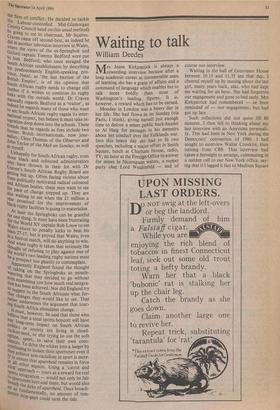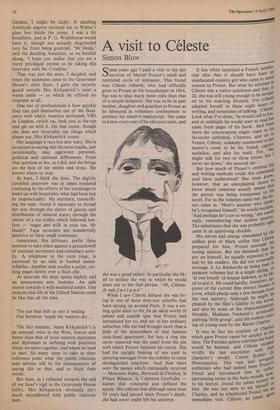Waiting to talk
William Deedes
Mrs Jeane Kirkpatrick is always a rewarding interview because after a long academic career at innumerable seats of learning she has a grasp of affairs and a command of language which enables her to talk more boldly than most of Washington's leading figures. It is, however, a reward which has to be earned. Monday in London was a heavy day in her life. She had flown in on Sunday (via Paris, I think), giving herself just enough time to deliver a smart public back-hander to Al Haig for passages in his memoirs about her conduct over the Falklands war. Into this heavy day she had to fit two speeches, including a major effort in Smith Square, lunch at Chatham House, radio, TV, an hour at the Foreign Office to answer for mines in Nicaraguan waters, a supper party chez Lord Weidenfeld — and of
course our interview.
Waiting in the hall of Grosvenor House between 10.15 and 11.35 am that day, I cheered myself up by musing about the last girl, many years back, alas, who had kept me waiting for an hour. She had forgotten our engagement and gone to bed early. Mrs Kirkpatrick had remembered — or been reminded of — our engagement, but had got up late.
Such reflections did not quite fill 80 minutes. I then fell to thinking about my last interview with an American personali- ty. This had been in New York during the Democrats' convention of 1980. I had sought to interview Walter Cronkite, then retiring from CBS. That interview had taken a fortnight to arrange, culminating in a sudden call to our New York office, say- ing that if I legged it fast to Madison Square
Garden, I might be lucky. A dazzling American negress escorted me to Walter's glass box inside the arena. I was a bit breathless, and as P. G. Wodehouse would have it, though not actually disgruntled very far from being gruntled. `Mr Deals,' said the dazzling American, as we bustled along, 'I hope you realise that you are a vurry privileged person to be taking this interview with Mr Cronkite.'
That was just the note, I decided; and when the summons came to the Grosvenor House's sixth floor, I gave the security guard outside Mrs Kirkpatrick's suite a warm smile — to which he offered no response at all.
One test of professionals is how quickly they can pull themselves out of the flum- mery with which America surrounds VIPs in London, switch on, look you in the eye and get on with it. On that count, though she does not invariably say things which please use, Mrs Kirkpatrick scores.
Her language is racy but also wary. She is on record as saying that the news media, just occasionally, may aggravate personal, political and national differences. Point that question at her, as I did, and she brings on the best of her smiles and stops. She knows where to stop.
At least, I think she does. The slightly curtailed interview was at times rendered confusing by the efforts of her entourage to make up with hospitality what had been lost by unpunctuality. My secretary, transcrib- ing the tape, found it necessary to thread her way through the clatter of glasses and distribution of mineral water; through the clatter of a tea trolley which followed hot- foot — 'sugar and milk in your tea, Mr Deals?' Tape recorders are wonderfully sensitive to these small courtesies.
Americans, like Africans, prefer these sessions to take place against a groundswell of constant movement and subsidiary activ- ity. A telephone in the suite tings, is answered by an aide in hushed mono- syllables. Another aide studies a script, tur- ning pages slowly over a thick clip.
At intervals the door opens slightly and an anonymous arm beckons. An aide moves towards it with muttered asides. One reckons that life at the United Nations must be like that all the time.
The sun that bids us rest is waking Our brethren 'neath the western sky...
The fact remains, Jeane Kirkpatrick's is an unusual voice in the West, braver and better than that of most western statesmen and diplomats at defining with precision where we move together, and where we tend to part. So many seem to take as their reference point what the public relations man advises will be the consequences of saying this or that, and so blunt their words.
But then, as I reflected towards the end of my hour's vigil in the Grosvenor House lobby, Mrs Kirkpatrick obviously isn't much encumbered with public relations men.











































 Previous page
Previous page